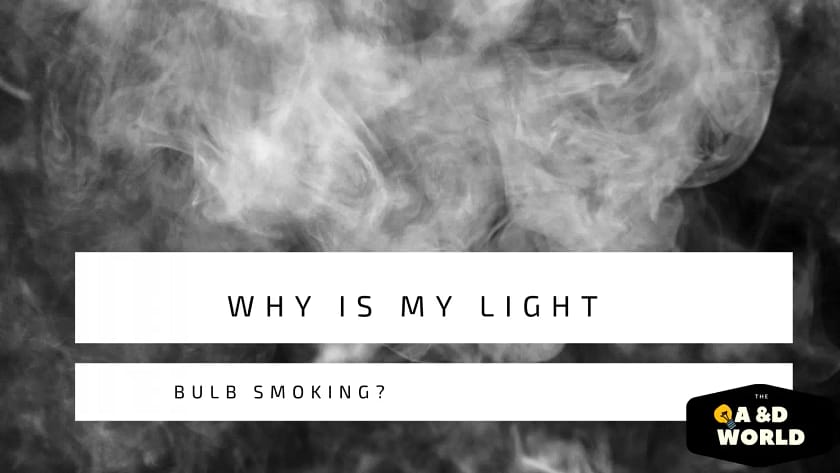Like any electrical device, a light bulb can overheat and cause a fire. You may notice signs like smoke or the light bulb stops working immediately. However, this incident is preventable.
A common cause of a smoking lightbulb is overheating. Before installing a new bulb, make sure it has the correct wattage for the socket. While this may seem apparent, the wrong wattage can cause damage to your home’s wiring and even pose a fire hazard. The second way to avoid overheating is to check your lights regularly. Crooked lamps can stress the wiring and cause premature failure or a fire.
Finally, be sure to use lights intended for indoor or outdoor use (and vice versa). If you use indoor luminaires outdoors, condensation can form inside the globe, leading to failure or fire.
Other Possible Causes of Light bulb Smokes
- The light bulb could be defective or damaged. Check the glass to make sure it is not cracked or broken. If you believe the bulb is damaged, remove it from the socket and dispose of it properly (most local landfills will accept burned-out bulbs).
- If you are using CFLs or halogen bulbs, they may not be suitable for your fixture. Read the label on your existing fixture and see if there is information about what type(s) of bulbs are compatible with this fixture. The wattage listed on the fixture may be lower than the bulb you are installing. For example, do not install a 100-watt bulb in a fixture rated for 60 watts. Further, ensure the maximum wattage is on the fixture before installing a new bulb.
- Bugs are attracted to light bulbs and can stick, causing a bit of smoke on your bulb. Start by turning off the fixture to prevent any electrocution. Then carefully unscrew the bulb and dispose of the bug. An enclosed fixture can prevent insects from sticking to your bulb.
- Is the light bulb touching something flammable? If your light bulb touches a curtain or lampshade, for example, the material could become warm enough to ignite. If you smell smoke, turn off all fuses and remove anything near your bulb.
A Problem With Your Electrical System
Another reason your light bulb is smoking is a bad connection. A bad connection can occur somewhere in the circuit. If there are no signs of fire or heavy smoke, turn off the circuit breaker and check for these problems immediately.
After turning off the power to your electrical system at the breaker box, remove the bulb from its sockets and inspect for other signs of damage. A faulty connection between the fixture and the wire can cause an increase in electrical flow to the bulb, resulting in burnout.
Moreover, make sure you are using bulbs with high-quality filaments and bases that are compatible with your fixtures.
Poor Dimmer Compatibility
While this is less likely to occur, using a LED bulb on an old dimmer can cause serious problems.
Many energy-efficient bulbs require a special type of dimmer designed specifically for these types of bulbs. Check the instructions on the bulb to see if it requires a different dimmer. Installing a new dimmer compatible with your bulb will remedy the problem.
Is It Normal For A Light Bulb To Smoke When It Burns Out?
If you are seeing smoke or other signs that your CFL bulb is malfunctioning, do not worry. This is normal! CFLs are the only type of bulb that smokes when they are at the end of their life.
Similarly, there are other signs like dimming, a popping sound, or discoloration at the base. If it is a new bulb and it’s smoking, then this is a cause of concern. Popping and smoking when it burns out is an indication the CFL was working correctly.
Are Burnt-Out Light Bulbs Toxic?
Once the bulb isn’t broken then there is no need to worry about toxicity. According to posion.org, CFL has up to 5 milligrams (mg of mercury which is lower than your average thermometer. However, you should still take precautions when exposing CFL.
If your CFL is broken open the windows and exits the room. Expose any appliance( vacuum bag) or material used in a sealed bag. With other bulbs like LEDs, your can reuse and recycle the bulbs.
How Long Does It Take For A Light Bulb To Start A Fire?
Depending on the cause of overheating, a bulb can take anyway from six months to minutes. Faulty electrical wires connected to the bulb can ignite immediately. However, if your light bulb is close to a curtain or cloth, it can take a while for the material to catch fire.
To Recap,
Smoke can be dangerous. It is not always associated with fire, but smoke is a sign of serious problems that need fixing. Not only is smoke a nuisance and a potential health hazard, but it can eventually lead to a fire – a situation no one wants in their home.
If your bulb is smoking, turn off all power sources immediately. In a situation involving an electrical device and fire, it’s always better to be safe than sorry. If the problem is overheating, it may require a professional. Overheating can be faulty parts in the bulb or something serious like a voltage problem.




